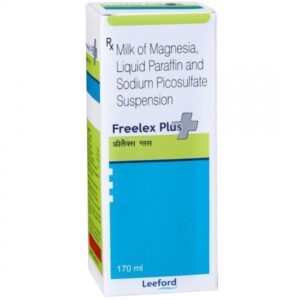PARAFFIN LIQUID + MAGNESIA AND SIMETHICONE + MILK
Paraffin Liquid: Drug Name: Paraffin Liquid
Use: Paraffin Liquid is a type of mineral oil that is primarily used as a laxative to relieve constipation. It helps to soften and lubricate the stool, making it easier to pass.
Mechanism of Action: Paraffin Liquid works by coating the stool, preventing water from being absorbed from it, and keeping it soft. It also helps to stimulate the intestines, promoting bowel movements.
Dose: The typical recommended dose for Paraffin Liquid is 15-30 mL (1-2 tablespoons) daily, taken orally. The dose may vary based on individual needs and should be determined by a healthcare professional.
Side Effects: While Paraffin Liquid is generally considered safe and effective when used as directed, there are some potential side effects that may occur. These include abdominal cramps, nausea, bloating, diarrhea, and a decrease in the absorption of fat-soluble vitamins.
It is important to note that prolonged or excessive use of Paraffin Liquid may lead to dependence on laxatives and can interfere with the body’s natural bowel function. Therefore, it is recommended to use this medication for short-term relief of constipation under the guidance of a healthcare professional.
As with any medication, it is best to consult with a healthcare professional before starting Paraffin Liquid to ensure its suitability and to discuss any potential interactions with other medications or underlying medical conditions.
Magnesia And Simethicone: Magnesia And Simethicone, also known as Magnesium Hydroxide and Simethicone, is a combination medication used to treat symptoms related to excessive stomach acid, such as heartburn, indigestion, and upset stomach. It is available over-the-counter and by prescription.
Magnesia And Simethicone has two active ingredients:
1. Magnesium Hydroxide: It works as an antacid by neutralizing excess stomach acid, which helps alleviate symptoms like heartburn and indigestion. Magnesium hydroxide can also act as a laxative by drawing water into the intestines to promote bowel movements.
2. Simethicone: It is an anti-foaming agent that reduces gas in the digestive tract. It helps relieve symptoms of excessive gas and bloating by breaking down gas bubbles, allowing them to be expelled more easily.
The recommended dose of Magnesia And Simethicone may vary depending on the individual and the severity of symptoms. It is usually taken orally, either as a chewable tablet or liquid suspension. The medication should be taken as directed on the label or as advised by a healthcare professional.
Like any medication, Magnesia And Simethicone may cause side effects. Common side effects may include diarrhea, stomach cramps, and increased bowel movements due to the laxative effect of magnesium hydroxide. These side effects are usually mild and temporary. If any severe or persistent side effects occur, it is important to consult a healthcare professional.
It is essential to read the medication’s label and follow the instructions carefully. Individuals with specific medical conditions, such as kidney problems or a history of allergies, should consult their healthcare provider before using Magnesia And Simethicone. Additionally, it is important to avoid taking this medication with certain other medications, as they may interact and cause adverse effects. Always consult a healthcare professional or pharmacist to ensure the safe and appropriate use of this medication.
Milk: I’m sorry, but “Milk” cannot be classified as a drug as it refers to a natural substance rather than a medication. Milk is a nutrient-rich fluid produced by mammals, primarily for the nourishment of their young. It is a staple in human diets and contains vital nutrients like calcium, protein, vitamins, and minerals.
While milk itself is not a drug, there are medications derived from or based on milk components. One such example is lactase supplements, which are used to aid the digestion of lactose, a sugar found in milk. Lactase supplements may be helpful for individuals with lactose intolerance, a condition where the body is unable to fully digest lactose.
The mechanism of action for lactase supplements is quite straightforward. Lactase is an enzyme naturally produced in the small intestine that helps to break down lactose into simpler sugars for absorption. In individuals with lactose intolerance, their bodies do not produce enough lactase, resulting in difficulty digesting lactose. By taking lactase supplements, the deficiency is compensated, and the lactose can be effectively broken down.
The recommended dose of lactase supplements may vary depending on the individual’s level of lactose intolerance and the severity of their symptoms. It is best to consult a healthcare professional or follow the instructions on the product packaging for proper dosage guidance.
Side effects of lactase supplements are generally mild and uncommon. They may include gastrointestinal symptoms like gas, bloating, diarrhea, and abdominal discomfort. These side effects are usually temporary and improve with continued use or by adjusting the dosage.
It’s worth noting that if an individual has allergies or sensitivities to milk or milk-derived products, they should consult a healthcare professional before taking lactase supplements or any other milk-based medication.
Overall, milk and its derived products can be an essential part of a balanced diet, providing numerous nutrients and aiding in digestion through lactase supplements for those with lactose intolerance.

